Get a line on factory directs — both the benefits and challenges of being in control of the mattress manufacturing process and selling to consumers
Even with the attendant challenges, owners of factory directs are committed to their business model, which gives them control over the entire mattress manufacturing process — and allows them to sell their bedding directly to their customers.
Many of them are less fond of the term “factory direct.”
“The first thing to know about the factory-direct model is that it’s truly direct to consumer. It always has been. We’re the original direct-to-consumer model,” says Christopher Nolte, chief executive officer of the Milwaukee, Wisconsin-based Verlo Mattress chain and president of Marcus Investments, which bought Verlo in 2012. “I think every factory direct has done a disservice calling ourselves that. The value is not that we’re a factory, but that we’re selling directly to you, the consumer. We’re giving the customer the best product and best buying experience because our expertise and knowledge is in purchasing, design, manufacturing and selling directly to the consumer.”
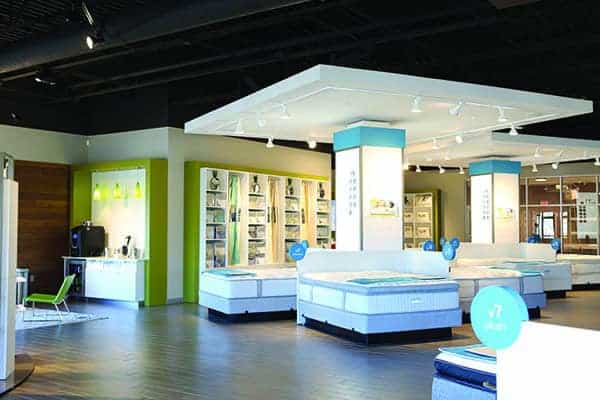
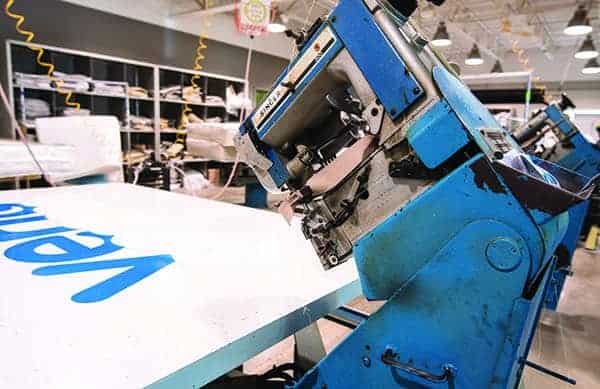
“The value is not that we’re a factory, but that we’re selling directly to you, the consumer,” says Christopher Nolte, chief executive officer of Verlo Mattress and president of Marcus Investments. Verlo operates 19 “microfactories” and has about 35 retail locations across several states.
“It’s clean, organized. We take pride in handcrafting our mattresses.”
Joplimo Mattress promotes that its beds are “locally made in the Ozarks,” “built to a better standard” and come with a “lifetime comfort guarantee” — and also avoids the factory-direct moniker.
“In my personal opinion, I think when people hear ‘factory direct,’ people expect a cheap bed or cheap price because I’m ‘cutting out the middle man,’ ” says Brian Croft, president of the 10-store sleep shop chain, which has headquarters in Joplin, Missouri. “So, we don’t say we’re a factory direct. We talk about the quality of our brand and our locally handcrafted beds.”
In using terms like “direct to consumer” and “locally made,” these companies are highlighting strengths of their operations. But there are significant challenges to sticking with one of the industry’s oldest business models, too. BedTimes spoke to a handful of manufacturer-retailers about how they are positioning their companies for continued success, however they choose to describe their businesses.
(Before we move on, we should note that BedTimes takes to heart the issues that manufacturer-retailers raised about the term factory direct, but given the mattress industry’s familiarity with the concept, we’ll use it occasionally in this article.)
“The old-fashioned way”
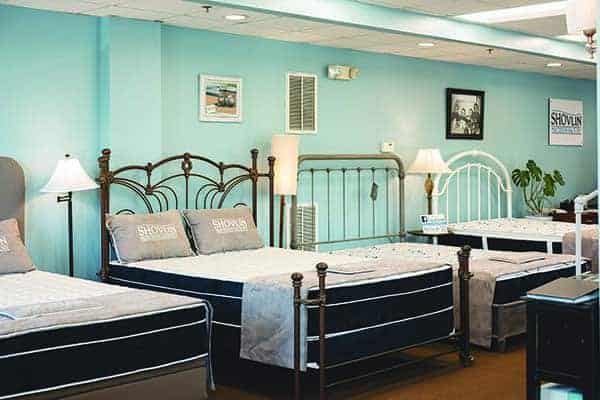
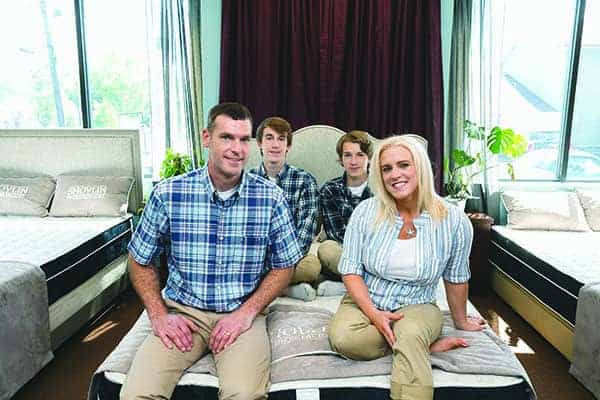
Shovlin Mattress factory, operated by Ron Shovlin and his wife, Kara, has found a successful niche promoting itself as a family-run, locally owned business that makes mattresses “the old-fashioned way.”
International Sleep Products Association, factory directs make up just 3% of the U.S. mattress market.
Shovlin Mattress Factory, a family-run business with a dual 8,500-square-foot manufacturing facility and retail space in Fanwood, New Jersey, fits neatly into that historical model. And owner Ron Shovlin is committed to remaining a manufacturer-retailer, in large part, because it allows him to make mattresses his way, or, as he puts it, “the old-fashioned way.” Most of the company’s mattresses are two-sided models with a traditional 13-gauge, 368 double offset coil unit at the core.
What you won’t find in Shovlin mattresses are any of the memory foams, gels and pocketed coils ubiquitous in most other companies’ beds. Shovlin makes 14 models for retail, with price points ranging from $799 to $3,499 in queen size. Its latest introduction is a luxurious innerspring mattress featuring organic cotton and wool, Talalay latex and horsehair. At $7,000 in queen size, the price point is a big step up for the company, and a departure in another way: Shovlin doesn’t own a tufting machine so he has outsourced production of the bed to another manufacturer.
“If it takes off like I hope it will, I’ll buy my own machine,” he says. “I like to have control over the process, and my factory workers have been with me for so long — one for 36 years, one for 17 years — that they think like an owner. So, even when I’m not back there, they make mattresses just like I would.”
Shovlin says only about 15% of his customers take the opportunity to tour the factory to see how their beds are made, but they “like getting something custom built for them.”
“Their mattress isn’t sitting in a warehouse somewhere,” Shovlin says. “When they order it, it will be made just for them.” Still, to strengthen the connection to its manufacturing capabilities in shoppers’ minds, Shovlin is considering installing windows from the showroom into the factory or setting up TV screens.
Customers also like that Shovlin Mattress Factory is a family-operated, locally owned company, Shovlin says. “They like to see that, with New Jersey losing manufacturers left and right, we’re thriving,” he says.
“They like that our employees all come from a 10-mile radius and the fact that when they spend their money with us, it stays in the community. We get 70% of our components from the three-state area (New Jersey, New York and Pennsylvania) and try to work with family-run businesses when we can.”
In control
Although their businesses are more than 850 miles apart and the two haven’t met, Shovlin and Karpathian of Harbor Springs Mattress Co. run their companies in similar ways.
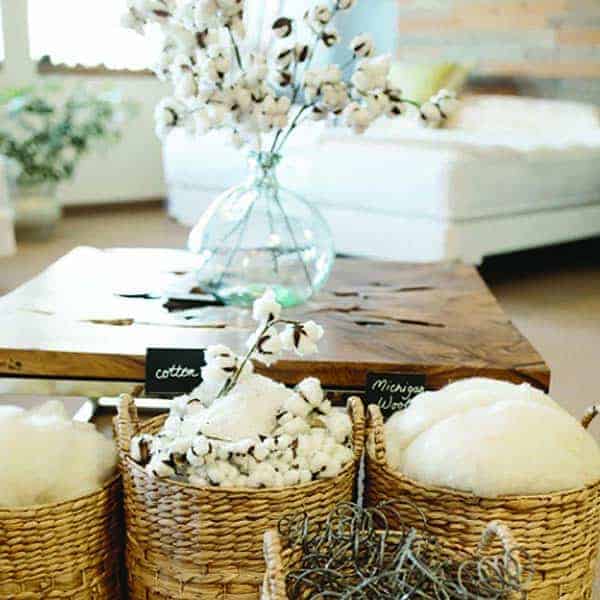
“Being in the business so long, I was fortunate to work for some great companies and great factories, but I saw the industry changing and I liked the old-fashioned way of making beds,” Karpathian says. “I like using natural materials — wools, cottons, natural rubbers — and
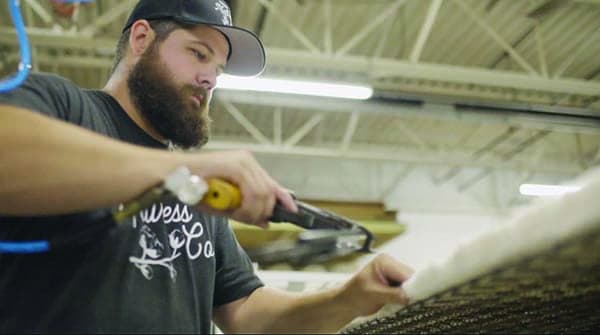
Harbor Springs Mattress Co. uses traditional materials such as cotton, wool and latex in its tufted mattresses. The factory direct has just four employees, including craftsman Zach Russell, who not only makes mattresses but delivers them, too.
consider myself just an old bed maker. It’s my blood. I love making beds. I tell my customers, ‘I didn’t invent making beds this way, I just resurrected what we did 40 or 50 years ago, that craftsmanship.’ ”
Harbor Springs has just four employees and a 1,200-square-foot manufacturing facility and retail space, with sliding glass doors separating the two parts to give shoppers a view of the bed-making process. “Before I started my company, I had 350 employees in three shifts, producing 1,600 pieces a shift,” Karpathian says. “Now, on a great day for us, we do five or six pieces, and the guys who make the beds deliver them, too.”
The company makes four hand-tufted mattress models, as well as traditional box springs. “I don’t like selling half a bed,” he says, explaining his decision to offer two-sided mattresses when most of the industry has switched to single-sided versions. Opening price points start at about $1,500 for a queen size and go up to $4,800, with an average ticket of $3,500.
“A lot of older people remember this way of making and selling mattresses, and they come in saying, ‘I didn’t know people still did this,’ ” Karpathian says. “I hear that a lot. People are blown away. And when they buy a mattress, they brag to their friends about it.”
Harbor Springs has an additional showroom in Rochester, Michigan, outside Detroit, and, because of relationships Karpathian has with the owners, also sells beds through a furniture store in Suttons Bay, Michigan, and a design company in Williamsburg, Michigan. But, like many other factory directs, he doesn’t want to expand into wholesale mattress making.
“I’d rather open more of my own stores than sell wholesale to other furniture or mattress stores,” Karpathian says. “I’m very protective of what I make and want to have control over what I sell.”
Small manufacturer-retailers like Shovlin Mattress Factory and Harbor Springs have found ways to diversify their businesses without giving up control of their products. Shovlin supplies local hotels and fire houses with mattresses, and Harbor Springs has developed a “nice little niche business” making custom bedding for boats and motor coaches and to fit in antique bedroom furniture.
Customizing beds — and business models
That ability to customize mattresses is at the root of how factory directs tend to handle customer complaints about mattress comfort. Instead of offering product exchanges like other companies, manufacturer-retailers can take customers’ mattresses back into their factories, adjusting firmness levels on the spot.
“A hand-tufted mattress is so different than what most people are used to that there is an adjustment period, so we ask them to give it six weeks,” Karpathian says. “After that, we can take it back and make it softer or firmer as a one-time free adjustment and that usually does the trick. Our goal is to make customers for life so we want them to be happy.”
Shovlin Mattress Factory has a similar policy. “We can adjust anything,” Shovlin says. “I tell customers, ‘If I can’t get you comfortable, I’ll give you your money back.’ But because we can make the adjustments, I can’t remember the last time I had to write someone a check.”
Verlo Mattress uses its ability to adjust its customers’ mattresses as a major selling point, offering a “Lifetime Comfort Guarantee” to modify the mattress as customers’ bodies or needs change. The first adjustment is free during the first year or first 180 days, depending on the model.
“That’s part of what we offer our customers. All our products are adjustable at any time. They can call us, we’ll pick it up and adjust the comfort and bring it back to them,” Nolte says. “Adjustable mattresses aren’t new for us. We’ve been doing that for more than 60 years.”
The company offers innerspring, all-foam, latex and hybrid mattresses in eight collections, with retail queen-size prices starting at $99 and topping out around $3,000. Verlo beds, all available in two-sided options, also are customizable from the start. “Sometimes a custom bed can be scary to people and they get overwhelmed. Those people prefer to sample the wares and pick what’s best for them from what’s in the showroom,” Nolte says. “But all our beds are made the day before they are delivered, so in that regard they can be made as bespoke items.”
The company was founded in 1958 and has changed hands over the years, but its strategy of making mattresses one at a time and selling them directly to customers hasn’t shifted. Today, the company has about 35 locations spread across its home state of Wisconsin and in Colorado, Georgia, Illinois, Iowa and Missouri. Five stores in the Milwaukee area are corporately owned; the others are operated by franchisees.
Like some of the other larger manufacturer-retailers operating today, Verlo doesn’t make products at every retail location. Instead it has 19 “microfactories” dedicated to producing mattresses for Verlo showrooms. “It’s all very localized manufacturing, run by franchise owners who are the local experts in their markets,” Nolte says.
A product development committee including franchisees creates new mattress designs — with decisions informed by their constant contact with customers, Nolte says. “It’s like we’re always running a large, outward-facing marketing study by making mattresses for our customers and developing relationships with them,” he says. “We see every day what’s working and what people want.”
The challenges are real

So, for nearly a decade, he contracted with a mattress manufacturer in Missouri to make mattresses to his specifications and touted the handcrafted, locally made nature of the products. The arrangement worked well,
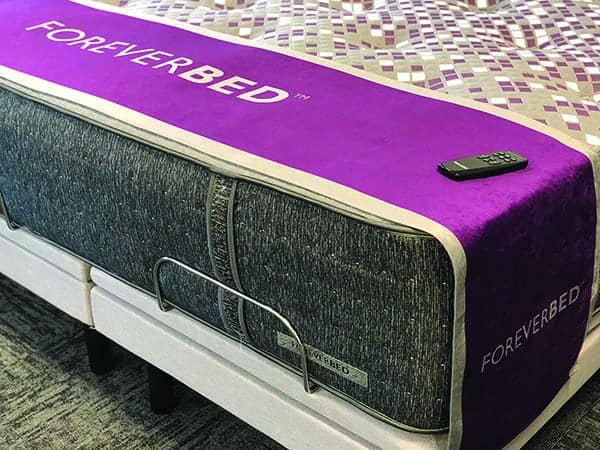
Joplimo Mattress, a growing chain with 10 stores in three states, became a “true” factory direct in July 2018, when Brian Croft, the company’s president, opened Croft Bedding Co. with Josh Wilson to make all the mattresses sold by the retail side of the business, including its high-end Foreverbed brand.
but changes at the other company necessitated Croft overcome his aversion to owning a plant. In July 2018, he and Josh Wilson, who previously worked at the contractor Joplimo had used, launched Croft Bedding Co. The factory makes mattresses for the Joplimo chain and, unlike some other factory directs, also wholesales to other retailers who are looking for the same type of quality bedding Brian Croft favors.
“Manufacturing is not something I wanted to get into,” Croft says. “(Using our contracted manufacturer) was like owning a factory without the headaches.”
Croft quickly learned just exactly how many headaches come with being fully responsible for the manufacturing side of the factory-direct model. “I instantly regretted it,” he says. “There were plenty of late nights, working until 2 in the morning, trying to get things done and still failing.” Machines broke down; beds were delivered late to Joplimo stores. Not long after opening the facility, Croft was talking to Paul Longman, founder and chief executive officer of iSense Sleep in nearby Springfield, Missouri. Longman offered to give Croft manufacturing advice if he ever needed it.
“Normally, I would politely decline an offer like that, but I said, ‘Can you come now?’ He showed up the next morning at 7:30 a.m. and stayed until 6,” Croft says. “He taught us his process, role-played with the team. We got on track after Paul’s visit, getting things done in six hours that had been taking us eight, 10, 12. He was amazing, but we were good students, too. From then on, we were getting our products to stores on time and the quality has been exceptional.”
Joplimo stores carry about 35 mattress models on the floor — though Croft is planning to streamline that to make a cleaner, clearer presentation for shoppers. Price points range from $299 to $6,500 in queen size, and mattresses are sold in two collections, the Croft brand and the higher-end Foreverbed brand.
Owning the factory, which serves all 10 Joplimo stores in Arkansas, Kansas and Missouri, now gives Joplimo the opportunity to more easily do the custom work that so many factory directs become known for in their areas.
“We’re able to take a mattress model on our showroom floor and make it double sided if a customer wants, or change out the ticking or add handles,” Croft says. “We also can do odd-sized mattresses, from heart shapes to circles, or make mattresses for trailers and RVs.”
Like Nolte and the franchisees at Verlo, Croft says he and his sales team use the direct customer feedback they receive while talking with shoppers on the sales floor when it’s time to design mattresses.
“We’re mattress geeks,” he says. “We love this stuff. We’re passionate about it. A lot of manufacturers out there are building beds based on a marketing story. Our guys know what we need to do not only to make a sale but to keep the customers happy in the long term.”
Not everyone makes it
Remember that 3% statistic from earlier in the article? Despite all the upsides to the business model, there are reasons that factory directs make up such a tiny percentage of mattress manufacturing today. The main challenges of the model are similar to those facing all types of smaller independent manufacturers and retailers — including rising costs for business basics like retail space and insurance.
Croydon Mattress Factory knows those difficulties all too well. The company recently closed the retail side of its business, moving out of its manufacturing plant and showroom in Bensalem, a township in Bucks County, Pennsylvania, says Ron Wolf, who co-owns the business with his father, Allen Wolf. The company will continue to serve its roster of retail, design and hospitality clients through the wholesale side of its business, Wolf Comfort Industries, contracting with other plants to manufacture the beds.
Allen Wolf, who’d worked both in his family’s furniture store and later for Sealy, started the business with his wife, Dorothy, in 1971 when they bought a small mattress manufacturer in Philadelphia, Keystone Bedding-Sylcon Mattress. The company specialized in private-label bedding for large furniture and department stores like Gimbels and Hess’s and later opened the retail side of its business, Croydon Mattress Factory, offering a full line of mattresses to showroom customers.
“We had a very nice run up through 2018,” Ron Wolf says. “We’ve always had the wholesale end of the business, and Dad and I decided at this point, it’s just about impossible for a small guy to compete as a factory direct anymore.”
Wolf says it’s difficult for small producers to introduce new lines with the frequency that big manufacturers now routinely do and points to escalating costs for virtually every aspect of the business, including components. “The business doesn’t feel like it’s made for the small guys anymore,” he says. “It’s made for the large organizations.”
Harbor Springs’ Karpathian agrees, noting that small mattress manufacturers don’t have the purchasing power to negotiate lower prices from suppliers. And Shovlin says that his preference for traditional manufacturing techniques brings its own problem: paying a premium for favored components — if he can even find them — as the industry embraces new technologies. Shovlin frequently laments no longer being able to buy jute pads that were once common in mattresses.
And then there are the problems on the retail side. Croft notes that he plans to open two to four Joplimo stores this year and expand into Oklahoma, but retail leasing rates are climbing, from what used to be $25 a square foot in his area to $50 or $60 a square foot. “Higher rents have shrunk the profit margins so it’s harder to make money on an individual store,” he says.
All the factory directs BedTimes spoke with talked about the challenges of competing with large mattress manufacturers who have seemingly unlimited marketing dollars to spend.
“We don’t have the advertising budget of the bigger guys,” Shovlin says. “We have to rely on referrals and word-of-mouth. So, when people move to the area, they may not know us and we may miss that initial mattress sale. But we’ll get them the second time they are in the market, usually when they experience product failure with the first mattress.”
The big boxed-bed brands are particularly hard to compete against, Karpathian says. “The biggest challenge for sure is the online companies,” he says. “They are killing us because I don’t have their deep pockets. I can’t compete with their ad dollars.”
The e-commerce model of selling mattresses may seem, at first glance, antithetical to the traditional factory-direct strategy, but in the modern era, even some long-time manufacturer-retailers are embracing online sales to compete for millennial and Gen Z customers.
Joplimo allows consumers to shop online and, while he still believes customers benefit from visiting the Shovlin Mattress Factory to rest-test mattresses, Ron Shovlin is upgrading his website to accept online orders.
At Verlo, customers can buy in-store or online. If they are in Verlo’s market, shoppers purchasing on the Verlo website will have their mattress made and delivered by the closest Verlo location so every customer has a “home store,” Nolte says. Consumers also can purchase Verlo-To-Go gel foam boxed beds.
And then there is Verlo’s own e-commerce brand, Sleepiphany, which is built on the company’s tradition of mattress customization and adjustability. Available at Sleepiphany.com, the 13-inch, five-layer mattress features a removable, zippered cover and comes with “recipe cards” showing customers how they can customize the mattress for their preferred level of comfort and support. It’s priced at $997 in queen.
“Sleepiphany lives up to all our brand promises of creating adjustable comfort for life,” Nolte says. “It’s the best product out there in that category, built for people who otherwise would not buy online.”





